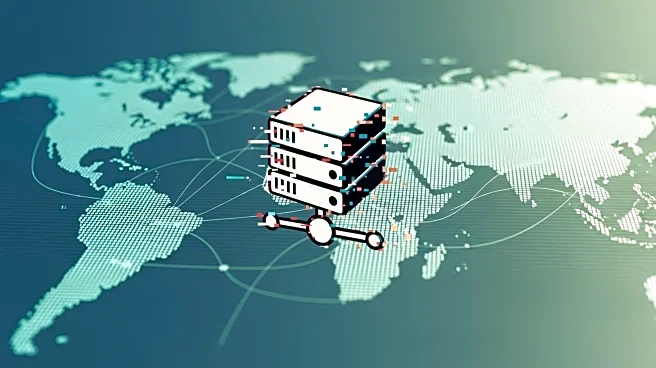What's Happening?
Amazon Web Services (AWS) experienced a significant outage on Monday, causing widespread disruption across the internet. The outage began shortly after midnight Pacific Time and affected over 2,000 companies, including major services like Snapchat, Fortnite,
Venmo, and the PlayStation Network. AWS, a cloud services provider owned by Amazon, supports a large portion of the internet infrastructure, and its failure led to increased error rates and latencies for multiple services, particularly in the US-East-1 region. The outage was attributed to a DNS issue, which is responsible for translating human-readable internet addresses into machine-readable IP addresses. AWS reported that the root cause was an internal subsystem responsible for monitoring the health of network load balancers. Recovery efforts were underway, with AWS throttling requests for new EC2 instance launches to aid in the process.
Why It's Important?
The AWS outage highlights the vulnerability of the internet's reliance on a few major cloud service providers. With AWS underpinning a significant portion of online services, any disruption can have widespread consequences, affecting businesses, social networks, and critical services like online banking. This incident underscores the need for resilience in cloud architecture, encouraging companies to distribute critical workloads across multiple regions to mitigate the impact of future outages. The outage also raises cybersecurity concerns, as technical faults can create opportunities for malicious actors to exploit vulnerabilities. As companies increasingly rely on cloud services, ensuring robust security measures and contingency plans becomes crucial to maintaining service continuity and protecting user data.
What's Next?
AWS is actively working on mitigating the residual network connectivity issues and plans to issue further updates. Companies affected by the outage may need to reassess their cloud strategies to enhance resilience against similar incidents. The outage serves as a reminder for organizations to diversify their cloud infrastructure and consider multi-region deployments to reduce the impact of localized failures. Additionally, users should remain vigilant against potential phishing attacks and scams exploiting the situation, as cybercriminals may attempt to capitalize on the heightened awareness of the outage.
Beyond the Headlines
The AWS outage may prompt a broader discussion on the concentration of internet infrastructure among a few major providers. As the digital economy grows, the dependency on cloud services like AWS could lead to increased scrutiny from regulators and policymakers regarding the stability and security of these platforms. The incident may also drive innovation in decentralized internet solutions, aiming to reduce reliance on centralized systems and enhance overall network resilience.















